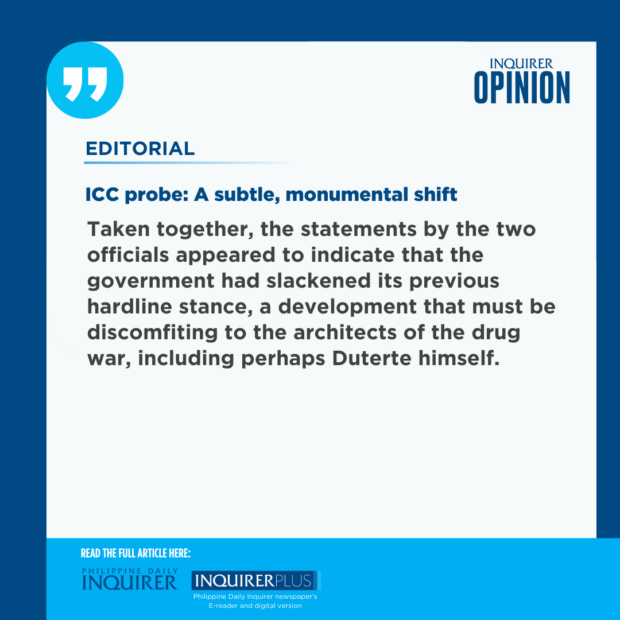ICC probe: A subtle, monumental shift

What a difference a few choice words can make.
Try as they might to deny it, two senior officials have signaled a subtle but monumental shift in the government’s approach to the International Criminal Court (ICC) prosecutor’s investigation of the Duterte administration’s bloody drug war.
Until last week, the Marcos administration had been adamant that the ICC’s Office of the Prosecutor (OTP), led by chief prosecutor Karim Khan, had no jurisdiction over Philippine officials believed responsible for the extrajudicial killing of drug suspects during Rodrigo Duterte’s terror-filled presidency from 2016 to 2022. Official data put the death toll at 6,000 but rights watchdogs believe the real number is closer to 20,000 because of underreporting or falsified records.
Article continues after this advertisementThe government’s position was crystal clear: There would be no cooperation with the ICC, since the Philippines, on Duterte’s unilateral order, withdrew its membership in 2018 and formally left the tribunal a year later. But something seems to have changed in recent weeks.
“[The Philippines] has no legal duty to lend any assistance to [Khan] in conducting his investigation. But the Philippine government cannot stop him from proceeding any way he wants,” Solicitor General Menardo Guevarra told reporters on Wednesday.
‘Won’t lift a finger’
At face value, the solicitor general’s words could be construed as a mere rephrasing of what President Marcos said in January and repeated over the past months—that the government “would not lift a finger” to help the OTP. But Guevarra’s second sentence gave pause: Why put emphasis on the government’s inability to impede the OTP from pursuing its mission?
Article continues after this advertisementThen on Thursday, Justice Secretary Jesus Crispin Remulla backed Guevarra’s statement, stressing that the government would not obstruct the International Criminal Police Organization (Interpol) from making arrests on the ICC’s behalf.
“We are not in the business of blocking any movement at Interpol,” the Department of Justice chief said at a press briefing.
If Guevarra’s remarks left some wiggle room, Remulla’s comments all but slammed the door shut on any scenario in which the government would actively prevent the OTP from doing its job. Taken together, the statements by the two officials appeared to indicate that the government had slackened its previous hardline stance, a development that must be discomfiting to the architects of the drug war, including perhaps Duterte himself. It might even belatedly explain all the noise coming from certain members of his family lately.
Die had been cast
The transition was so muted that on the day after Guevarra made his comment, only the Inquirer, among the top newspapers, headlined it as the banner story. Yet, after Remulla’s press conference—when there was no denying the die had been cast—four major broadsheets trumpeted the news the next day, including this paper.
For good reason, there was much squirming from the potentially affected.
Before Guevarra and Remulla spoke to the press, former senator Antonio Trillanes IV had shared a confidential ICC document tagging former Philippine National Police chief and now Sen. Ronald Dela Rosa and four others who had “concrete involvement” in the systematic drug killings. The others were retired PNP chief Oscar Albayalde, former Criminal Investigation and Detection Group chief Romeo Caramat Jr., former National Police Commission chief Edilberto Leonardo, and former PNP chief intelligence officer Eleazar Mata.
Positive step
Guevarra later confirmed the authenticity of the document and the OTP’s communications with his office, but clarified that the five were “not accused” but only “under suspicion” of crimes against humanity.
On Thursday, Albayalde told ANC: “I will allow myself [to be interviewed], if and only if the Department of Justice will tell us so.” Dela Rosa, for his part, took solace in the President’s previous declaration of non-cooperation, as he invoked his parliamentary immunity.
On the other hand, Trillanes said: “President Marcos will say what he needs to say, but when the time comes, he will do what he needs to do.”
Lawyer Kristina Conti, who represents families of drug war victims, said the officials’ assurance they would not get in the OTP’s way was a positive step. “To some extent it is a form of cooperation, because the ICC precisely needs states to allow it to work unhindered,” she told Inquirer reporter Kathleen de Villa.
Of course, it remains to be seen whether this is grounded in reality or wishful thinking.
As encouraging as the statements of Guevarra and Remulla are, it would take a while before the administration shows all its cards. For now, we can only hope its new position—if it can be called that—is not just for show or political leverage, but hinged on the paramount imperative of delivering justice for all the lives lost during the drug war. That is the ultimate test of the government’s seriousness to end the climate of impunity in our country.
















